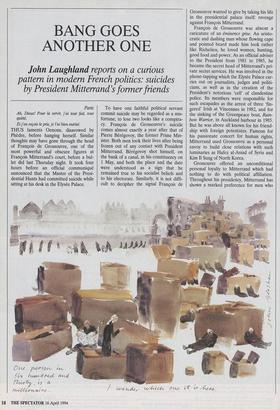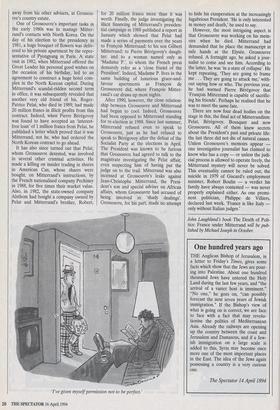BANG GOES ANOTHER ONE
pattern in modern French politics: suicides by President Mitterrand's former friends
Paris Ah, Dieux! Pour la servir, jai tout fait, tout gulag,
Et fen recois le prix je l'ai bien merite.
THUS laments Oenone, disavowed by Phedre, before hanging herself. Similar thoughts may have gone through the head of Francois de Grossouvre, one of the most powerful and obscure figures at Francois Mitterrand's court, before a bul- let did last Thursday night. It took four hours before an official communiqué announced that the Master of the Presi- dential Hunts had committed suicide while sitting at his desk in the Elysee Palace. To have one faithful political servant commit suicide may be regarded as a mis- fortune; to lose two looks like a conspira- cy. Francois de Grossouvre's suicide comes almost exactly a year after that of Pierre Beregovoy, the former Prime Min- ister. Both men took their lives after being frozen out of any contact with President Mitterrand. Beregovoy shot himself, on the bank of a canal, in his constituency on 1 May, and both the place and the date were understood as a sign that he remained true to his socialist beliefs and to his electorate. Similarly, it is not diffi- cult to decipher the signal Francois de Grossouvre wanted to give by taking his life in the presidential palace itself: revenge against Francois Mitterrand.
Francois de Grossouvre was almost a caricature of an eminence grilse. An aristo- cratic and dashing man whose flowing cape and pointed beard made him look rather like Richelieu, he loved women, hunting, good food and power. As an official adviser to the President from 1981 to 1985, he became the secret head of Mitterrand's pri- vate secret services. He was involved in the phone-tapping which the Elysee Palace car- ries out on journalists, judges and politi- cians, as well as in the creation of the President's notorious 'cell' of clandestine police. Its members were responsible for such escapades as the arrest of three 'fin- gered' Irish at Vincennes in 1982, and for the sinking of the Greenpeace boat, Rain- bow Warrior, in Auckland harbour in 1985. But he was above all known for his friend- ship with foreign potentates. Famous for his passionate concert for human rights, Mitterrand used Grossouvre as a personal envoy to build close relations with such luminaries as Hafez al-Assad of Syria and Kim II Sung of North Korea.
Grossouvre offered an unconditional personal loyalty to Mitterrand which had nothing to do with political affiliation. Throughout his presidency, Mitterrand has shown a marked preference for men who are devoted to him personally over those who support him because they are social- ists. Grossouvre was certainly not socialist: like Mitterrand, he had been on the extreme right in his youth. In 1940, he had joined the Service d'Ordre Legionnaire, Marshal Petain's crack troops, whose lead- er declared himself to be in the vanguard of the 'struggle for Europe', which was transformed into the Milice in 1943 after the German occupation of the Southern Zone. As such, Grossouvre came into con- tact with the police chief Rene Bousquet — an old friend of Mitterrand's who was murdered two days before he was due to go on trial for crimes against humanity last June — as well as with another officer in the same organisation, Paul Touvier. Also like Mitterrand, Grossouvre jumped ship and became a maquisard in 1943.
Grossouvre first met the future Presi- dent in 1961, when he accompanied Sena- tor Mitterrand, as he then was, on a visit to Chairman Mao in Peking. Mitterrand pub- lished a glowing book after the visit, enti- tled China's Challenge. 'Emancipated and unified,' he wrote, 'the new China draws together all forces turned towards the future.' Indeed, Mitterrand and Grossou- vre were provided with advice and contacts there by the same Rene Bousquet, who was by then a senior director of the Banque d'Indochine. Over the next 40 years, the two Francois were to become intimate, the one the devoted servant of the other. Grossouvre's private discussions with Mitterrand at the end of each day — either over dinner at Mitterrand's private flat on the Left Bank, or during walks together through the streets of Paris achieved legendary status as occasions when a message could be passed to the President, or a frank view expressed about what was going on. Indeed, Mitterrand often used to hole up for days on end, away from his other advisers, at Grossou- vre's country estate.
One of Grossouvre's important tasks in the early 1980s was to manage Mitter- rand's contacts with North Korea. On the day of his election to the presidency in 1981, a huge bouquet of flowers was deliv- ered to his private apartment by the repre- sentative of Pyongyang in Paris. A state visit in 1982, when Mitterrand offered the Great Leader his personal good wishes on the occasion of his birthday, led to an agreement to construct a huge hotel com- plex in the North Korean capital. During Mitterrand's scandal-ridden second term in office, it was subsequently revealed that another very old friend of his, Roger- Patrice Pelat, who died in 1989, had made 20 million francs in illicit profits from this contract. Indeed, when Pierre Beregovoy was found to have accepted an 'interest- free loan' of 1 million francs from Pelat, he published a letter which proved that it was Mitterrand, not he, who had ordered the North Korean contract to go ahead.
It has also since turned out that Pelat, whom Grossouvre detested, was involved in several other criminal activities. He made a killing on insider trading in shares in American Can, whose shares were bought, on Mitterrand's instructions, by the French nationalised company Pechiney in 1988, for five times their market value. Also, in 1982, the state-owned company Alsthom had bought a company owned by Pelat and Mitterrand's brother, Robert, for 20 million francs more than it was worth. Finally, the judge investigating the illicit financing of Mitterrand's presiden- tial campaign in 1988 published a report in January which showed that Pelat had made a series of payments over the years to Francois Mitterrand; to his son Gilbert Mitterrand; to Pierre Beregovoy's daugh- ter; and to a woman named only as `Madame P.', to whom the French press demurely refer as a 'close friend of the President'. Indeed, Madame P. lives in the same building of luxurious grace-and- favour apartments as Francois de Grossouvre did, where Francois Mitter- rand's car draws up most nights.
After 1990, however, the close relation- ship between Grossouvre and Mitterrand had begun to cool. Indeed, Grossouvre had been opposed to Mitterrand standing for re-election in 1988. Since last summer, Mitterrand refused even to speak to Grossouvre, just as he had refused to speak to Beregovoy after the defeat of the Socialist Party at the elections in April. The President was known to be furious that Grossouvre had agreed to talk to the magistrate investigating the Pelat affair, even suspecting him of having put the judge on to the trail. Mitterrand was also incensed at Grossouvre's leaks against Jean-Christophe Mitterrand, the Presi- dent's son and special adviser on African affairs, whom Grossouvre had accused of being involved in 'shady dealings'. Grossouvre, for his part, made no attempt `I've given myself permission not to he perfect.' to hide his exasperation at the increasingly lugubrious President. 'He is only interested in money and death,' he used to say.
However, the most intriguing aspect is that Grossouvre was working on his mem- oirs when he died. Mitterrand had demanded that he place the manuscript in safe hands at the Elysee. Grossouvre refused. A fortnight ago, he asked a jour- nalist to come and see him. According to the latter, he was 'in a state of collapse'. He kept repeating, 'They are going to frame me . . . They are going to attack me,' with- out saying how or who. The previous year, he had warned Pierre Beregovoy that `Francois Mitterrand is capable of sacrific- ing his friends'. Perhaps he realised that he was to meet the same fate.
There are now four dead bodies on the stage in this, the final act of Mitterrandism: Pelat, Beregovoy, Bousquet and now Grossouvre. All of them knew secrets about the President's past and private life: the last three did not die of natural causes. Unless Grossouvre's memoirs appear one investigative journalist has claimed to know who has a copy — or unless the judi- cial process is allowed to operate freely, the Mitterrand mystery will never be solved. This eventuality cannot be ruled out; the suicide in 1979 of Giscard's employment minister, Robert Boulin — a verdict his family have always contested — was never properly explained either. As one promi- nent politician, Philippe de Villiers, declared last week, 'France is like Italy only without Italian judges.'
John Laughland's book The Death of Poli- tics: France under Mitterrand will be pub- lished by Michael Joseph in October.




























































 Previous page
Previous page